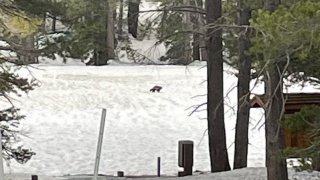
A lone wolverine was spotted in California last month, making it just the second confirmed wolverine to be seen in the state in roughly 100 years, wildlife officials announced Thursday.
The California Department of Fish and Wildlife (CDFW) believes the same wolverine was spotted multiple times in May in the eastern Sierra Nevada mountain range. Two sightings occurred in the Inyo National Forest in Inyo and Mono counties. Another sighting happened in Yosemite National Park in Tuolumne County.
Images of the animal taken by separate people in different spots were handed over to CDFW for analysis, the agency said. Scientists identified the animal as a wolverine based on its size, body proportion, coloring and movement patterns. CDFW teams also confirmed the locations of the sightings using coordinates from the footage.
"Wolverines can travel great distances, making it likely that the recent sightings are all of the same animal," CDFW Senior Environmental Scientist Daniel Gammons said in a statement. "Because only two wolverines have been confirmed in California during the last 100 years, these latest detections are exciting."
The last time a wolverine was seen in the state was from 2008 to 2018, CDFW said. That animal was first spotted in February 2008 in the Truckee area of the Tahoe National Forest.
Officials believe that wolverine and the one recently seen are two separate animals given that the lifespan for a wolverine is roughly 12 to 13 years.
Before the wolverine seen earlier this century, the last confirmed wolverine sightings in the state were all the way back in the 1920s, according to CDFW.
California
Members of the public are encouraged to report sightings or observations to CDFW via the Wildlife Incident Reporting system.
Wolverines can be found across Canada and Alaska, according to CDFW. Smaller populations can also be found in the Rocky and Cascade mountain ranges.
Get a weekly recap of the latest San Francisco Bay Area housing news. Sign up for NBC Bay Area’s Housing Deconstructed newsletter.
Wolverines are fully protected in California and listed as a threatened species under the California Endangered Species Act.



